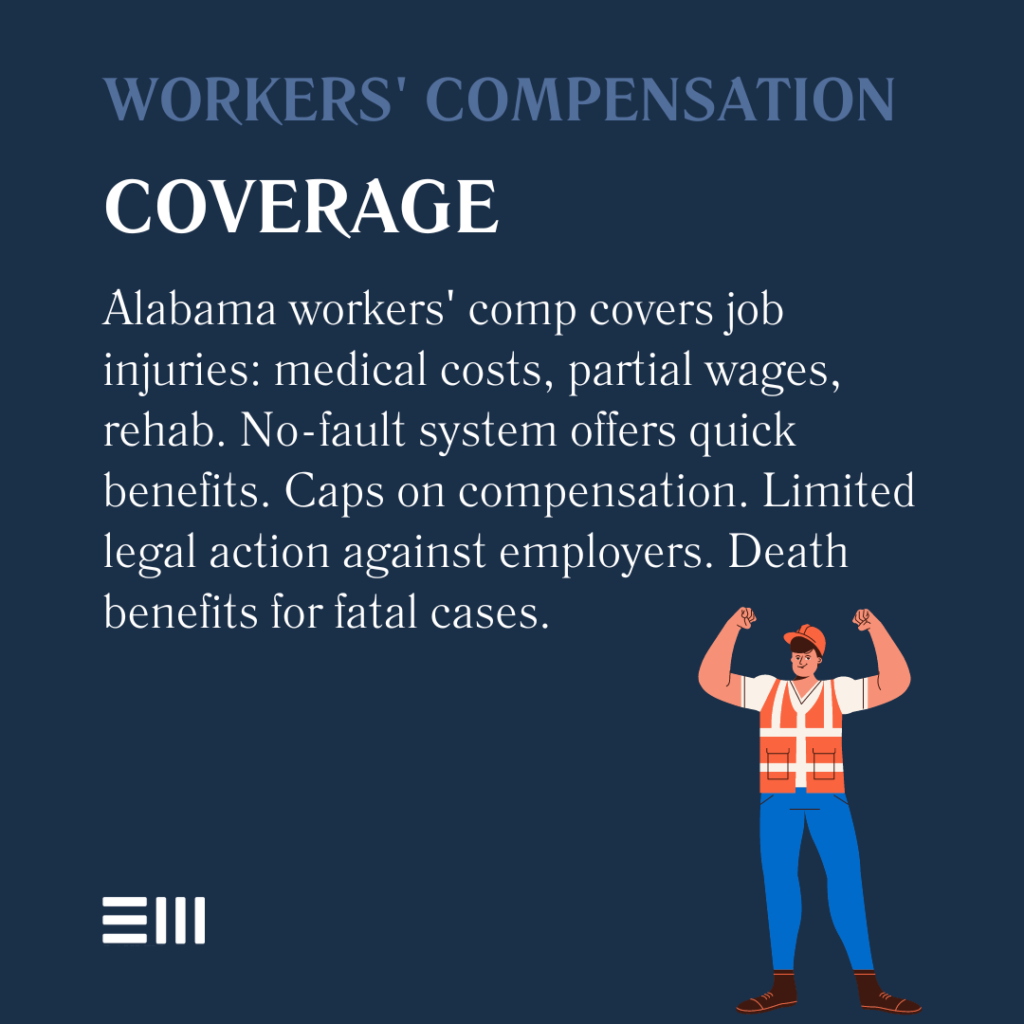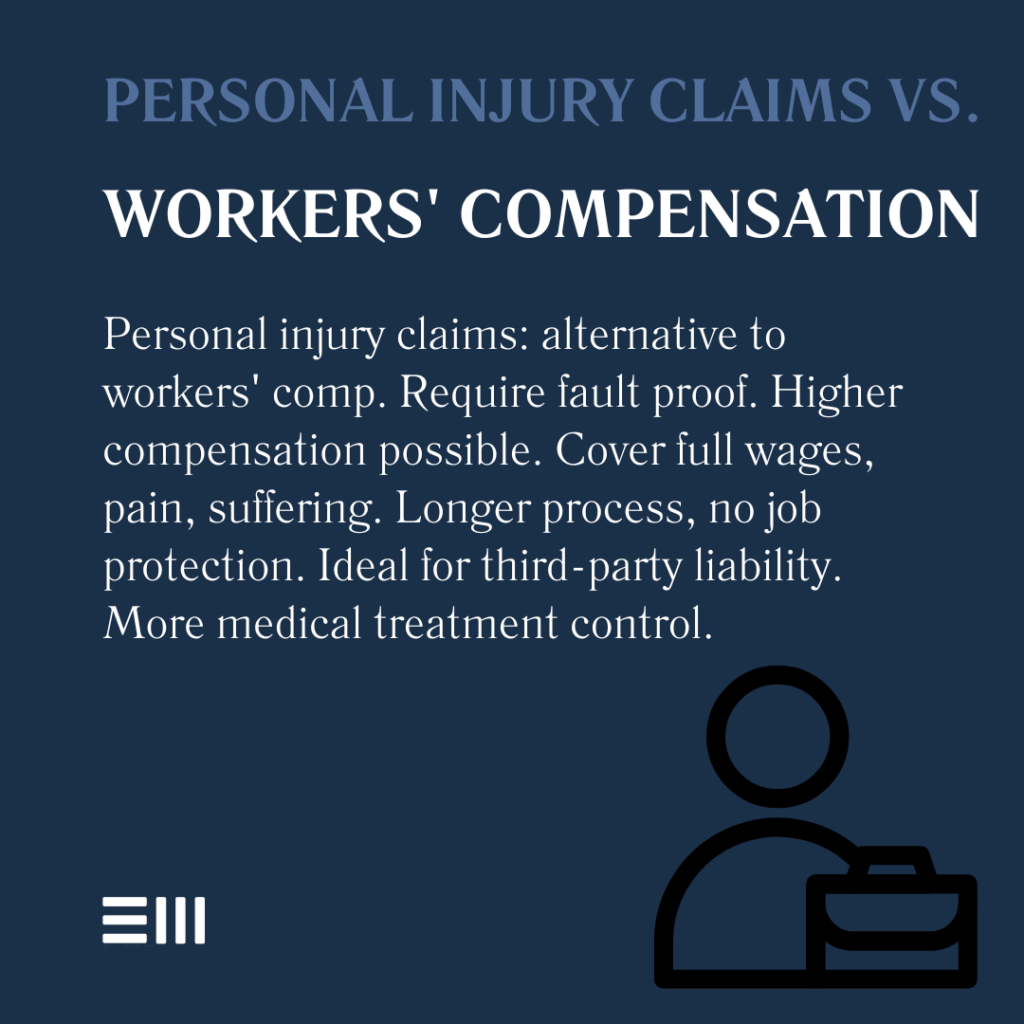
Did you know that, in 2022, Alabama reported 33,500 nonfatal workplace injuries and illnesses? This staggering statistic underscores the importance of understanding your rights and options when faced with a workplace accident.
Workplace accidents can turn your life upside down in an instant. One moment you’re going about your daily tasks, and the next, you’re dealing with injuries, medical bills, and lost wages.
In Alabama, navigating the aftermath of a workplace accident often involves choosing between workers’ compensation and personal injury claims. This choice can significantly impact your recovery, both physically and financially.
Understanding Workers’ Compensation in Alabama
Workers’ compensation is a system designed to provide benefits to employees who are injured or become ill due to their jobs.
In Alabama, most employers with five or more employees are required to carry workers’ compensation insurance.
What Does Workers’ Compensation Cover
Workers’ compensation in Alabama typically covers:
- Medical expenses related to the work injury;
- A portion of lost wages (usually two-thirds of your average weekly wage);
- Vocational rehabilitation if you can’t return to your previous job; and
- Death benefits for dependents if the workplace accident results in fatality.
It’s important to note that workers’ compensation benefits are generally provided regardless of fault. This means you can receive benefits even if the accident was due to your own negligence, with some exceptions.

Limitations of Workers’ Compensation
While workers’ compensation provides valuable benefits, it also has limitations:
- You cannot sue your employer for additional damages;
- Pain and suffering are not compensated;
- You may have limited control over your medical treatment; and
- Benefits are typically capped at a certain amount.
Understanding these limitations is crucial when deciding between workers’ compensation and a personal injury claim.
Personal Injury Claims for Workplace Accidents
In some cases, you may have the option to file a personal injury claim instead of or in addition to a workers’ compensation claim.
This typically occurs when a third party (someone other than your employer or co-worker) is responsible for your workplace injury.
When Can You File a Personal Injury Claim
You might be able to file a personal injury claim in situations such as:
- A defective product caused your injury;
- You were injured in a car accident while on the job;
- You were harmed by toxic substances in the workplace; and
- Your injury was caused by a third-party contractor on your work site.
Recognizing these scenarios is crucial, as they may open up additional avenues for compensation beyond traditional workers’ compensation claims.
Advantages of Personal Injury Claims
Personal injury claims offer several potential advantages:
- You may recover full compensation for lost wages;
- You can seek damages for pain and suffering;
- There’s potential for higher overall compensation; and
- You have more control over your medical treatment.
However, personal injury claims also require proving fault, which can make the process more complex and time-consuming.
Key Differences Between Workers’ Compensation and Personal Injury Claims
Understanding the distinctions between these two types of claims is crucial for making an informed decision about your case.
Fault Requirements
Fault is not typically a factor in workers’ compensation claims, as the system operates under a no-fault system. Employees are entitled to benefits regardless of who caused the injury.
In personal injury cases, however, the injured party must prove that the other party was negligent or at fault to recover compensation.
Types of Compensation Available
Workers’ compensation typically covers medical expenses, partially lost wages, and disability benefits.
In contrast, personal injury claims can provide more extensive compensation, including full lost wages, pain and suffering, emotional distress, and even punitive damages in cases of severe negligence.
Timeline for Benefits
Workers’ compensation benefits can begin relatively quickly after an injury, providing prompt financial and medical support.
On the other hand, personal injury claims often take longer to resolve, as they may require negotiations or litigation before any compensation is awarded.
Legal Process
The legal process for workers’ compensation tends to be simpler and involves fewer formal legal proceedings.
Personal injury cases often involve more complex litigation, which can extend the timeline for resolving the claim and securing compensation.
Impact on Employment
Workers’ compensation generally provides job protection for injured employees, allowing them to return to work when they are medically able.
There is no inherent job protection in personal injury cases, though other legal protections may exist depending on the circumstances of the injury.
By carefully weighing these differences, you can make a more informed decision about which path is best suited to your specific circumstances and long-term needs.

How to File a Workers’ Compensation Claim in Alabama
If you decide to pursue a workers’ compensation claim, follow these steps:
- Report the injury to your employer immediately (within five days is recommended);
- Seek medical attention from an authorized provider;
- File a First Report of Injury form with your employer;
- Follow all prescribed medical treatments; and
- Keep detailed records of your injury, treatment, and communications.
Remember, in Alabama, you generally have two years from the date of injury to file a workers’ compensation claim.
Pursuing a Personal Injury Claim for a Workplace Accident
If you’re considering a personal injury claim, here’s what you need to do:
- Gather evidence from the accident scene;
- Obtain witness statements if possible;
- Keep detailed medical records and bills;
- Document all lost wages and other financial impacts; and
- Consult with a personal injury attorney to evaluate your case.
In Alabama, the statute of limitations for personal injury claims is typically two years from the date of the accident.
Factors to Consider When Choosing Between Workers’ Compensation and Personal Injury Claims
When deciding which route to take, consider the following:
- The severity of your injury and long-term impact;
- The circumstances of your accident and potential third-party liability;
- Your current financial situation and need for immediate benefits;
- The potential long-term value of your claim;
- Your desire for control over medical treatment; and
- The impact on your employment relationship.
Each case is unique, and what works best for one person may not be ideal for another. It’s often helpful to consult with a legal professional to evaluate your specific situation.
Common Challenges in Workplace Accident Cases
Navigating a workplace accident claim can be complex. Here are some common challenges you might face:
Denied Claims
What happens if your workers’ compensation claim is denied? You have the right to appeal the decision.
The process typically involves:
- Filing a written appeal;
- Attending a hearing before an administrative law judge; and
- Presenting evidence to support your claim.
Appealing a denied claim requires careful preparation and persistence to improve your chances of a successful outcome.
Insufficient Benefits
If you feel your workers’ compensation benefits are inadequate, you may be able to:
- Request a reevaluation of your disability rating;
- Appeal the benefit calculation; and
- Explore additional legal options.
Ensuring your benefits are accurately calculated can make a significant difference in your financial recovery.
Returning to Work
Returning to work after an injury can be challenging. You might face issues such as:
- Accommodating work restrictions;
- Dealing with reduced earning capacity; and
- Facing potential discrimination.
Understanding your rights and the protections available under Alabama law is crucial in these situations.
The Role of Legal Representation in Workplace Accident Cases
While it’s possible to handle a workers’ compensation claim on your own, many people find value in legal representation, especially in complex cases.
An experienced attorney can:
- Ensure you meet all filing deadlines;
- Help gather and present evidence effectively;
- Negotiate with insurance companies on your behalf;
- Represent you in hearings or court proceedings; and
- Advise you on the best course of action for your specific situation.
For personal injury claims, legal representation is often crucial due to the complexity of proving fault and negotiating settlements.
Frequently Asked Questions
Navigating the complexities of workplace accident claims often raises numerous questions.
Here are answers to some of the most common inquiries we receive.
How Long Do I Have to Report a Workplace Injury in Alabama?
In Alabama, it’s recommended to report a workplace injury to your employer as soon as possible, ideally within five days. However, you have up to 90 days to provide notice of your injury. Failing to report within this timeframe could jeopardize your claim.
Can I Choose My Own Doctor for a Workers’ Compensation Claim?
Initially, your employer has the right to select your treating physician for a workers’ compensation claim in Alabama. However, if you’re dissatisfied with the care you’re receiving, you can request a panel of four alternative physicians from which you can choose.
Can I Be Fired for Filing a Workers’ Compensation Claim?
It’s illegal for an employer to fire you solely for filing a workers’ compensation claim. However, workers’ compensation doesn’t provide absolute job protection. If you’re unable to perform your job duties due to your injury, your employer may be able to replace you.
How Are Workers’ Compensation and Personal Injury Settlements Taxed?
Generally, workers’ compensation benefits are not taxable at the state or federal level. Personal injury settlements are typically not taxed, except for any portion allocated to punitive damages or interest.
Protect Your Rights and Secure Your Future
Don’t let confusion or uncertainty prevent you from obtaining the compensation you deserve after a workplace accident.
At Baxley Maniscalco, we understand the complexities of both workers’ compensation and personal injury claims in Alabama. Our experienced team is ready to evaluate your case, explain your options, and fight for your rights.
Can't find what you're looking for? Search our site below.










